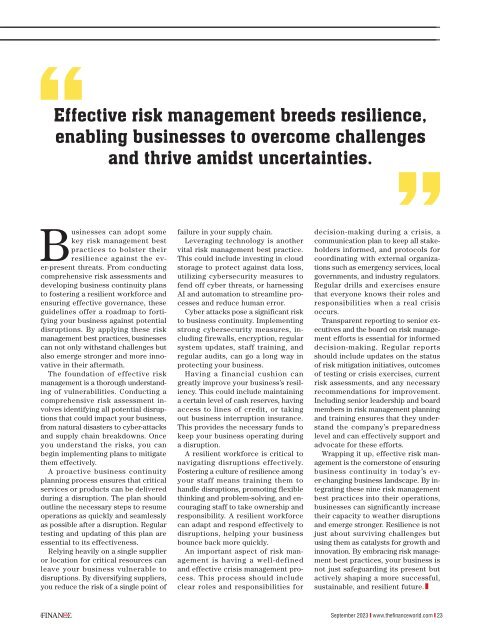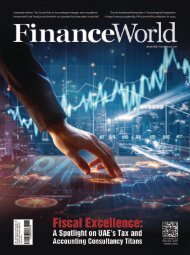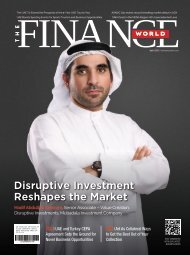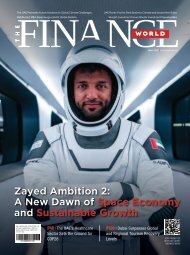The Finance World Magazine| Edition: September 2023
The Middle East is currently experiencing a transformative era characterized by sustainability and governance, known as the Middle East's Green Renaissance. At the heart of this movement is the Environmental, Social, and Governance (ESG) framework, which is reshaping corporate success by placing a strong emphasis on transparency, accountability, and responsible global citizenship. ESG investing is reshaping financial markets, aligning financial gains with societal and environmental impacts. The Middle East has pledged significant net-zero commitments, underscoring its commitment to environmental stewardship. As the Middle East prepares to host COP28 in Dubai, it remains committed to sustainability. This edition explores the Middle East's ESG journey, from milestones to future horizons. This edition provides insightful perspectives across diverse sectors within the UAE. it provides insights on certain areas of focus, such as The Key to Mitigating Risks in Stock Market Portfolios, Cross-Border M&A: Challenges and Opportunities in Global Transactions, Risk Management Best Practices for Ensuring Business Continuity, Fintech Innovations Shaping the Future, and many more articles that offer critical analysis and insights on current trends and issues in the business and investment domains. Keep yourself up to date with all financial sector news with our current news segments. Each person can find something unique from us. We believe our readers deserve real value from what we have to offer.
The Middle East is currently experiencing a transformative era characterized by sustainability and governance, known as the Middle East's Green Renaissance. At the heart of this movement is the Environmental, Social, and Governance (ESG) framework, which is reshaping corporate success by placing a strong emphasis on transparency, accountability, and responsible global citizenship.
ESG investing is reshaping financial markets, aligning financial gains with societal and environmental impacts. The Middle East has pledged significant net-zero commitments, underscoring its commitment to environmental stewardship.
As the Middle East prepares to host COP28 in Dubai, it remains committed to sustainability. This edition explores the Middle East's ESG journey, from milestones to future horizons.
This edition provides insightful perspectives across diverse sectors within the UAE. it provides insights on certain areas of focus, such as The Key to Mitigating Risks in Stock Market Portfolios, Cross-Border M&A: Challenges and Opportunities in Global Transactions, Risk Management Best Practices for Ensuring Business Continuity, Fintech Innovations Shaping the Future, and many more articles that offer critical analysis and insights on current trends and issues in the business and investment domains.
Keep yourself up to date with all financial sector news with our current news segments. Each person can find something unique from us. We believe our readers deserve real value from what we have to offer.
You also want an ePaper? Increase the reach of your titles
YUMPU automatically turns print PDFs into web optimized ePapers that Google loves.
Effective risk management breeds resilience,<br />
enabling businesses to overcome challenges<br />
and thrive amidst uncertainties.<br />
Businesses can adopt some<br />
key risk management best<br />
practices to bolster their<br />
resilience against the ever-present<br />
threats. From conducting<br />
comprehensive risk assessments and<br />
developing business continuity plans<br />
to fostering a resilient workforce and<br />
ensuring effective governance, these<br />
guidelines offer a roadmap to fortifying<br />
your business against potential<br />
disruptions. By applying these risk<br />
management best practices, businesses<br />
can not only withstand challenges but<br />
also emerge stronger and more innovative<br />
in their aftermath.<br />
<strong>The</strong> foundation of effective risk<br />
management is a thorough understanding<br />
of vulnerabilities. Conducting a<br />
comprehensive risk assessment involves<br />
identifying all potential disruptions<br />
that could impact your business,<br />
from natural disasters to cyber-attacks<br />
and supply chain breakdowns. Once<br />
you understand the risks, you can<br />
begin implementing plans to mitigate<br />
them effectively.<br />
A proactive business continuity<br />
planning process ensures that critical<br />
services or products can be delivered<br />
during a disruption. <strong>The</strong> plan should<br />
outline the necessary steps to resume<br />
operations as quickly and seamlessly<br />
as possible after a disruption. Regular<br />
testing and updating of this plan are<br />
essential to its effectiveness.<br />
Relying heavily on a single supplier<br />
or location for critical resources can<br />
leave your business vulnerable to<br />
disruptions. By diversifying suppliers,<br />
you reduce the risk of a single point of<br />
failure in your supply chain.<br />
Leveraging technology is another<br />
vital risk management best practice.<br />
This could include investing in cloud<br />
storage to protect against data loss,<br />
utilizing cybersecurity measures to<br />
fend off cyber threats, or harnessing<br />
AI and automation to streamline processes<br />
and reduce human error.<br />
Cyber attacks pose a significant risk<br />
to business continuity. Implementing<br />
strong cybersecurity measures, including<br />
firewalls, encryption, regular<br />
system updates, staff training, and<br />
regular audits, can go a long way in<br />
protecting your business.<br />
Having a financial cushion can<br />
greatly improve your business’s resiliency.<br />
This could include maintaining<br />
a certain level of cash reserves, having<br />
access to lines of credit, or taking<br />
out business interruption insurance.<br />
This provides the necessary funds to<br />
keep your business operating during<br />
a disruption.<br />
A resilient workforce is critical to<br />
navigating disruptions effectively.<br />
Fostering a culture of resilience among<br />
your staff means training them to<br />
handle disruptions, promoting flexible<br />
thinking and problem-solving, and encouraging<br />
staff to take ownership and<br />
responsibility. A resilient workforce<br />
can adapt and respond effectively to<br />
disruptions, helping your business<br />
bounce back more quickly.<br />
An important aspect of risk management<br />
is having a well-defined<br />
and effective crisis management process.<br />
This process should include<br />
clear roles and responsibilities for<br />
decision-making during a crisis, a<br />
communication plan to keep all stakeholders<br />
informed, and protocols for<br />
coordinating with external organizations<br />
such as emergency services, local<br />
governments, and industry regulators.<br />
Regular drills and exercises ensure<br />
that everyone knows their roles and<br />
responsibilities when a real crisis<br />
occurs.<br />
Transparent reporting to senior executives<br />
and the board on risk management<br />
efforts is essential for informed<br />
decision-making. Regular reports<br />
should include updates on the status<br />
of risk mitigation initiatives, outcomes<br />
of testing or crisis exercises, current<br />
risk assessments, and any necessary<br />
recommendations for improvement.<br />
Including senior leadership and board<br />
members in risk management planning<br />
and training ensures that they understand<br />
the company’s preparedness<br />
level and can effectively support and<br />
advocate for these efforts.<br />
Wrapping it up, effective risk management<br />
is the cornerstone of ensuring<br />
business continuity in today’s ever-changing<br />
business landscape. By integrating<br />
these nine risk management<br />
best practices into their operations,<br />
businesses can significantly increase<br />
their capacity to weather disruptions<br />
and emerge stronger. Resilience is not<br />
just about surviving challenges but<br />
using them as catalysts for growth and<br />
innovation. By embracing risk management<br />
best practices, your business is<br />
not just safeguarding its present but<br />
actively shaping a more successful,<br />
sustainable, and resilient future.<br />
<strong>September</strong> <strong>2023</strong> www.thefinanceworld.com 23

















